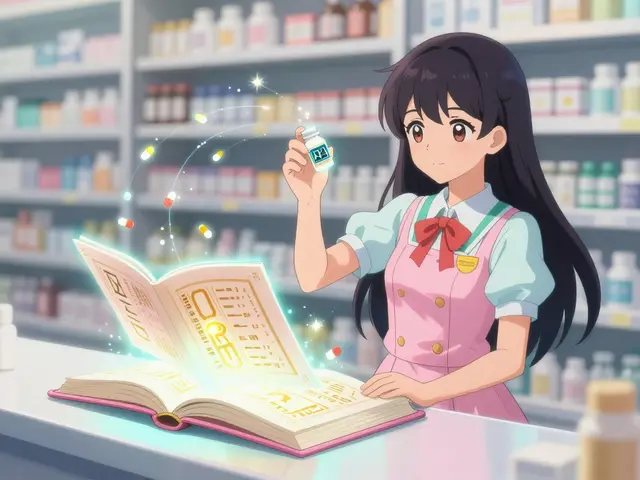When you pick up a prescription, you might see two options: the brand-name drug you’ve heard of, or a much cheaper generic version. Many people wonder - is the generic just as good? Or are you risking your health to save money? The answer isn’t as simple as yes or no, but the science is clearer than most people think.
What Does ‘Generic’ Actually Mean?
A generic drug isn’t a copycat or a knockoff. It’s required by law to contain the exact same active ingredient, in the same strength, and delivered the same way - whether it’s a pill, injection, or inhaler - as the original brand-name drug. The FDA doesn’t approve generics based on trust. It demands proof.Before a generic hits the shelf, the manufacturer must run bioequivalence studies. These tests measure how quickly and how much of the drug enters your bloodstream. The FDA requires that the generic’s absorption rate falls within 80% to 125% of the brand-name version. That’s not a wide range - it’s tight. If your blood levels of the drug vary more than that, it’s rejected.
These aren’t lab simulations. They’re done on real people - usually 24 to 36 healthy volunteers - in crossover studies where each person takes both the brand and the generic at different times. The data is analyzed statistically. If the results meet the standard, the FDA says: approved.
What Do Large-Scale Studies Say?
In 2020, researchers in Austria analyzed data from over 1.5 million people using 17 different medications for chronic conditions like high blood pressure, diabetes, and heart failure. They compared outcomes between patients taking brand-name drugs and those taking generics. The results were striking: for 10 of the 17 drugs, patients on generics had fewer deaths. For 11, they had fewer major heart events.The five-year survival rate for those on generics was 85.9%, compared to 77.8% for those on brand-name drugs. After adjusting for age, income, and other factors, the gap narrowed but didn’t disappear. Generics still performed better or equally well.
Another massive study in 2019, looking at 3.5 million patients across the U.S., checked outcomes for common drugs like amlodipine (for blood pressure), glipizide (for diabetes), and escitalopram (for depression). The results? No meaningful difference in hospitalizations, emergency visits, or treatment failure between brand and generic versions. In fact, for amlodipine and its combo with benazepril, generics were linked to slightly lower heart risks.
A 2022 analysis of 1.2 million patients with high blood pressure found no difference in hospitalization rates between generic and brand-name ACE inhibitors. The hazard ratio was 1.02 - meaning essentially the same risk.
When Do Generics Fall Short?
There’s a small but important group of drugs where tiny differences matter. These are called narrow therapeutic index (NTI) drugs. That means the difference between a dose that works and one that’s toxic is very small.Examples include warfarin (blood thinner), levothyroxine (for thyroid), phenytoin and lamotrigine (for seizures), and cyclosporine (for transplant patients). For these, even a 5% variation in blood levels can cause problems - too little and the condition returns; too much and you risk side effects.
One 2023 study in Epilepsia found that patients switched between different generic versions of levetiracetam had an 18% higher chance of having a seizure. Another study documented cases where patients on generic levothyroxine had fluctuating thyroid levels after switching manufacturers - even though all versions met FDA bioequivalence standards.
Why does this happen? It’s not because the active ingredient is different. It’s because of the inactive ingredients - fillers, coatings, binders. These don’t treat the disease, but they can affect how quickly the drug dissolves in your stomach. For NTI drugs, that small delay or speed-up can change how much gets absorbed.
That’s why some neurologists and endocrinologists prefer patients to stick with one generic manufacturer - or even stick with the brand - if it’s working. It’s not about quality. It’s about consistency.

What Do Patients Actually Experience?
Real-world feedback is mixed. On one hand, GoodRx reviews show 78% of users say generic medications work just as well as brand names. Medicare seniors report that 68% noticed no difference in effectiveness when switching to generics.But another 22% say they had minor side effects - like nausea, dizziness, or fatigue - that didn’t happen before. For many, these faded after a few weeks. For others, they didn’t.
Online forums are full of stories. One Reddit user wrote: “I tried three different generics for Synthroid. Only one kept my TSH stable.” Another said, “I was seizure-free for years on brand-name lamotrigine. Switched to a generic - had a breakthrough seizure two weeks later.”
These aren’t rare. A 2013 study found that about 30% of patients reported no change, 30% felt better, 10% had new side effects, and 30% stopped taking the generic because they felt it didn’t work.
Here’s the catch: sometimes, the problem isn’t the drug - it’s the expectation. If you believe generics are inferior, your brain might interpret normal side effects as “the generic isn’t working.” That’s called the nocebo effect. But when patients report real, measurable changes - like rising TSH levels or new seizures - that’s not psychology. That’s physiology.
How Do Doctors and Pharmacists Handle This?
Most doctors trust generics. A 2020 survey found 87% of physicians have full confidence in their efficacy. But specialists - neurologists, endocrinologists, cardiologists - are more cautious. They know the science. They also know the exceptions.Pharmacists are required by law to substitute a generic unless the doctor writes “dispense as written.” In 2022, only 3.2% of prescriptions had that restriction. That means 97% of the time, you get the cheaper version unless you ask otherwise.
The FDA’s Orange Book lists every approved drug and its therapeutic equivalence rating. A-rated generics are considered interchangeable. B-rated ones aren’t - and should be avoided unless specifically prescribed. But most patients don’t know this exists. Pharmacists rarely explain it.
That’s a gap. If you’re on a critical medication - especially for thyroid, epilepsy, or blood thinning - ask your pharmacist: “Is this the same manufacturer as last time?” If it changed, ask your doctor if you should monitor your levels more closely.
Are Generics Safe? What About Recalls?
Yes, generics are safe - but no drug is perfect. In 2021, a batch of generic valsartan (a blood pressure drug) was recalled because of a cancer-causing impurity called nitrosamine. The problem wasn’t unique to generics - the brand-name version was recalled too. But because generics are made by dozens of manufacturers, a problem in one factory can affect thousands of people.The FDA’s Generic Drug User Fee Amendments (GDUFA III), running from 2023 to 2027, is investing over $1 billion to improve inspections and testing of generic drug factories - especially those overseas. The goal: catch problems before they reach patients.

Bottom Line: Should You Take Generics?
For most people, the answer is yes - without hesitation. For common conditions like high blood pressure, diabetes, depression, and high cholesterol, generics are just as effective, and often safer because they’re more affordable. People stick with them longer. They take fewer doses. They have fewer complications.But if you’re on a narrow therapeutic index drug - levothyroxine, warfarin, phenytoin, lamotrigine, cyclosporine - pay attention. If you switch generics and feel different, don’t ignore it. Track your symptoms. Get your blood tested. Talk to your doctor. You might need to stick with one brand or one generic manufacturer.
The data doesn’t lie: generics save the U.S. healthcare system over $377 billion a year. They’re not a compromise. They’re a smart, science-backed choice - as long as you know when to watch closely.
What You Can Do Today
- If you’re on a common medication: Switch to generic without worry. You’re saving money and getting the same treatment.
- If you’re on a narrow therapeutic index drug: Ask your pharmacist which manufacturer you’re getting. If it changes, ask your doctor if you need a blood test.
- If you feel worse after switching: Don’t assume it’s in your head. Document your symptoms and bring them to your provider.
- Use the FDA’s Orange Book: Search for your drug online. If it’s rated “A,” it’s interchangeable. If it’s “B,” ask why.
Are generic drugs as effective as brand-name drugs?
Yes, for the vast majority of medications, generics are just as effective. The FDA requires them to meet strict bioequivalence standards, meaning they deliver the same amount of active ingredient into your bloodstream at the same rate as the brand-name version. Large studies involving millions of patients show no meaningful difference in outcomes for conditions like high blood pressure, diabetes, and depression.
Why do some people say generics don’t work for them?
Some patients, especially those on narrow therapeutic index drugs like levothyroxine or lamotrigine, report changes in how they feel after switching generics. This isn’t always due to the drug’s effectiveness - it can be caused by differences in inactive ingredients that affect absorption. In rare cases, switching manufacturers can lead to measurable changes in blood levels, which may require monitoring or staying with one version.
Can I trust generic drugs made overseas?
Yes. The FDA inspects all manufacturing facilities - whether in the U.S., India, China, or elsewhere - using the same standards. Over 50% of generic drugs sold in the U.S. are made overseas, and the FDA’s inspection rate for these facilities has increased significantly since 2017. While recalls have happened (like the 2021 valsartan contamination), they’re rare and affect both brand and generic versions.
Should I always ask for the brand-name drug if I can afford it?
Only if you’re on a narrow therapeutic index drug and have had problems switching generics. For most conditions - like high cholesterol, asthma, or acid reflux - there’s no medical reason to pay more. The brand-name drug isn’t better. It’s just more expensive. Generics are the standard of care for good reason.
How do I know if my generic is FDA-approved and safe?
All FDA-approved generics are listed in the Orange Book, which you can search online. Look for the drug name and check its therapeutic equivalence rating. “A” means it’s interchangeable. “B” means it’s not. If your pharmacy gives you a different generic than before, ask if it’s the same manufacturer. If you’re unsure, ask your pharmacist to verify the approval status.
Do generics have more side effects than brand-name drugs?
No - not because of the active ingredient. But sometimes, differences in inactive ingredients (like dyes or fillers) can cause minor side effects in sensitive individuals. These are usually mild and temporary. If you experience new or worsening side effects after switching to a generic, talk to your doctor. It’s not common, but it happens - and it’s fixable.
What’s Next?
The future of generics is about complexity. New drugs - like inhalers, patches, and injectables - are harder to copy. The FDA is preparing for this by requiring more advanced testing for these “complex generics” by 2025. But the goal remains the same: make safe, effective, affordable medicine available to everyone.You don’t need to choose between cost and care. Generics deliver both - as long as you know which ones to trust and when to ask questions.





Douglas Fisher
Wow, this is one of the most balanced, well-researched takes I've seen on generics in a long time! Seriously, thank you for laying out the nuance-most people just scream 'generic = bad' or 'generic = perfect' without understanding the science. The NTI drug stuff? Crucial. I'm on levothyroxine, and I switched generics twice and ended up with a TSH spike that scared me straight back to the brand. Not because I 'believed' generics were worse-but because my body reacted. Blood tests don't lie. Always check your labs after a switch. Also, the Orange Book? Most people don't know it exists. This post should be mandatory reading for every pharmacy tech.
Albert Guasch
It is imperative to underscore the empirical validity of bioequivalence protocols as established by the Food and Drug Administration. The 80–125% confidence interval for AUC and Cmax is not arbitrary; it is statistically rigorous and clinically validated across thousands of crossover trials. Furthermore, the longitudinal epidemiological data from the Austrian cohort and the U.S. multi-million-patient analyses confirm non-inferiority-and in certain instances, superior outcomes-associated with generic pharmacotherapy. The nocebo effect, while psychobiologically plausible, must be disentangled from physiologically documented variability in absorption kinetics, particularly in the context of excipient heterogeneity. This is not anecdote. This is evidence-based medicine.
Ginger Henderson
Okay but like… aren’t generics just the same pills with a different label? 😴
Bethany Buckley
How fascinating! The ontological collapse of pharmaceutical identity in the neoliberal pharmacopoeia is truly emblematic of late-stage capitalist healthcare commodification. 🤔✨ We’ve reduced therapeutic intervention to a commodified bioequivalence metric-yet the phenomenological experience of the patient, the embodied truth of their tremor, their fatigue, their seizure… that’s the real epistemic rupture, isn’t it? 🌌💊 The FDA’s ‘A’ rating is a bureaucratic fiction masking the ontological instability of the pill. I mean… have you ever *felt* a generic? It’s not the same energy. 🌈
Stephanie Deschenes
Thank you for this. I'm a pharmacist and I see this confusion every day. The biggest issue isn't the drugs-it's the lack of communication. Patients don't know to ask about manufacturer changes. Pharmacists are rushed. Doctors assume the patient knows. We need better handoffs. If you're on warfarin or levothyroxine, write down your manufacturer name and ask for it every time. If they can't give it to you, ask your doctor to write 'dispense as written.' It's a small step that saves lives. And yes, the Orange Book is real. It's free. Use it.
Cynthia Boen
This post is just pharma propaganda. You think the FDA is some holy guardian? They’re paid off. I’ve seen people go from perfect health on brand to hallucinating on generics. And you call that ‘science’? The real reason generics are pushed is because insurance companies are greedy. They don’t care if you die-they care if your co-pay is $5 instead of $50. Wake up.
Amanda Meyer
I appreciate the data, but I’m troubled by the assumption that ‘most people’ are fine with generics. What about those who are sensitive to dyes, fillers, or coating agents? I have a friend with celiac disease who had a severe reaction to a generic because of a wheat-based binder. That’s not rare. And the FDA’s inspections overseas? They’re a joke. A 2022 whistleblower report showed 40% of inspected Indian plants had serious compliance issues. We need transparency-not just approval ratings. Can we get a public database of which manufacturers supply which generics? Because right now, it’s a lottery.
Jesús Vásquez pino
Bro, I’ve been on generic amlodipine for 7 years. Zero issues. Cost me $4 a month. My cousin was on the brand, paid $120. Same pill. Same results. Why are people so scared of saving money? You’re not getting a weaker drug-you’re getting the same drug without the marketing budget. If your doctor says it’s fine, trust them. Stop overthinking it. Unless you’re on thyroid or seizure meds-then yeah, be smart. But for blood pressure? Just take the cheap one and stop worrying.
hannah mitchell
My grandma switched to generic Synthroid and started feeling shaky. She didn’t say anything for months because she didn’t want to be ‘difficult.’ Finally, she asked her doctor to test her TSH. It was off by 30%. They switched her back to the brand-and she’s fine now. No drama. No panic. Just a quiet, important adjustment. If you’re on a critical med, don’t assume everything’s fine just because you feel ‘okay.’ Check your labs. It’s that simple.
vikas kumar
As someone from India where we make a lot of these generics, I’ve seen factories up close. Yes, some are sketchy. But many are world-class-better than some U.S. plants. The problem isn’t country of origin. It’s oversight. And honestly? Most people don’t need brand. But if you’re diabetic, hypertensive, or epileptic? Know your version. Ask your pharmacist. Keep a note. Don’t let someone else decide your health for you. Generics are great-but knowledge is power.